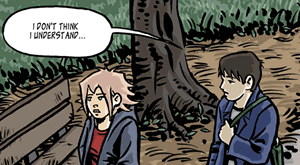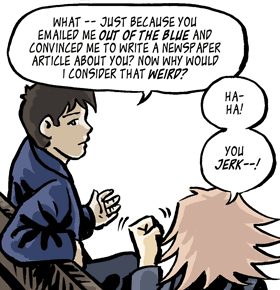Audrey, the main character in Benjamin Rivers’ Empty Words is a Registered Practicing Nurse in a long-term care facility. She is a new employee, and has just experienced her first on-the-job death, an aspect of the job that she finds difficult to deal with. In fact, she’s having trouble dealing with her job period, with what she sees as the warehousing of old people until they die — so much so that it is starting to affect her relationships with friends and family.
On one occasion when Audrey has stopped into a local coffee shop to try to escape her onrushing depression, she meets Greg, a freelance writer who is trying to find an idea worth selling to the local newspaper. As the coffee shop staff boot them out into the pouring rain, Greg offers Audrey his umbrella, leaving a clear open invitation to contact him later, to give it back, though he doesn’t give her his name.
 The next day, Audrey reads an article in the paper about the death of a reforming junkie, and realizes that it was written by Greg. His email address is at the bottom of the article, and she uses this to contact him. Although her message is sent in a pessimistic mood, she is pleasantly surprised at the response it gets.
The next day, Audrey reads an article in the paper about the death of a reforming junkie, and realizes that it was written by Greg. His email address is at the bottom of the article, and she uses this to contact him. Although her message is sent in a pessimistic mood, she is pleasantly surprised at the response it gets.
Almost immediately after they meet at the coffee shop, Audrey insists she’s got the subject for Greg’s stories, relating her job at the long-term care center. As Audrey’s comments seem to hit home, Greg agrees to write her story.
Rivers handles Audrey’s distress over the situation in the care center in a manner that strikes to the heart of the issue. Anyone who has visited one of these centers can relate, can recognize the loneliness and sadness that is almost a physical, tangible presence in these places, and makes them terrible to enter. How anyone can work in them boggles the mind, except for how Audrey’s co-worker Angela describes it: one day, you just "turn off." Audrey’s distress and guilt are very real, and her efforts — her need — to tell someone else about it are very understandable.
 At the same time that Audrey is trying to unburden herself of her psychic load to Greg, the two of them are also developing a rapport, of sorts. While he agrees to tackle the story of the patients of the long-term care center, Greg has other ideas about his meeting with Audrey. Then, when Audrey catches Greg apparently checking out their waitress, an old acquaintance named Juno, she lets down her hair, literally. This is a subtle act that could easily be missed at first, even though the action is thoroughly shown (possibly because Audrey’s hair is fairly short and spiky to begin with). But once you realize what she’s done, that short two-page sequence suddenly implies something much deeper…
At the same time that Audrey is trying to unburden herself of her psychic load to Greg, the two of them are also developing a rapport, of sorts. While he agrees to tackle the story of the patients of the long-term care center, Greg has other ideas about his meeting with Audrey. Then, when Audrey catches Greg apparently checking out their waitress, an old acquaintance named Juno, she lets down her hair, literally. This is a subtle act that could easily be missed at first, even though the action is thoroughly shown (possibly because Audrey’s hair is fairly short and spiky to begin with). But once you realize what she’s done, that short two-page sequence suddenly implies something much deeper…
Audrey and Greg are circling around one another, not like prizefighters looking for an opening through which to attack, but more like leaves in an eddy, swirling around the center while coming ever closer to one another. As with the leaves, they may not know where they’re going; Audrey may have some inkling, as the move with her hair shows, but a later discussion with Juno draws out that she’s not quite ready to admit it to herself. And Greg is having a similar talk with himself.
 Much of Empty Words is internal, with the roiling emotions that Audrey is dealing with at work, and what seems to be developing between her and Greg. Although introspection might not seem to be a subject easily projected through a graphic medium, Rivers does an excellent job of portraying the thoughts and emotions of his characters, even in silence. He’s not afraid of taking plenty of time to show a wordless sequence, in order to make certain that the reader understands what he’s trying to say. The scene where Audrey lets down her hair is an excellent example, and Greg’s confusion over it only adds to the deliberate tone of the story. The reader can see Audrey and Greg spiral in towards one another, slowly yet inevitably.
Much of Empty Words is internal, with the roiling emotions that Audrey is dealing with at work, and what seems to be developing between her and Greg. Although introspection might not seem to be a subject easily projected through a graphic medium, Rivers does an excellent job of portraying the thoughts and emotions of his characters, even in silence. He’s not afraid of taking plenty of time to show a wordless sequence, in order to make certain that the reader understands what he’s trying to say. The scene where Audrey lets down her hair is an excellent example, and Greg’s confusion over it only adds to the deliberate tone of the story. The reader can see Audrey and Greg spiral in towards one another, slowly yet inevitably.
 Rivers’ artwork complements the pace of Empty Words, looking very much like virtual woodcuts. His use of color, beginning with a cel-shading technique but including cross-hatch coloring and fades adds a depth to the linework. His choice to work in muted tones, even among the primary colors, adds to the sense of gravity, and to the subtle and deliberate manner in which Audrey and Greg are dealing with one another.
Rivers’ artwork complements the pace of Empty Words, looking very much like virtual woodcuts. His use of color, beginning with a cel-shading technique but including cross-hatch coloring and fades adds a depth to the linework. His choice to work in muted tones, even among the primary colors, adds to the sense of gravity, and to the subtle and deliberate manner in which Audrey and Greg are dealing with one another.
Although the character design is definitely influenced by manga, with upturned noses and spiky hair (and the nurse Angela looks a lot like Greg on this page), the presentation is very much in the Western comics tradition. The characters spend much of their time gazing pensively, sitting and talking, or walking slowly, but their motions are realistic and natural.
The title of Empty Words might refer to those empty words that adult children spout in promises to their elderly parents, when the tragic day comes that they enter a long-term care center such as the one Audrey works at. Promises to call, to visit, to remember. It might also refer to those empty words that men and women pass back and forth between one another while they circle, leaves in eddies. They each lead to different destinations, one to a long dark loneliness and the other up out of a different sort. In Empty Words, Benjamin Rivers gives us a thoughtful examination of both, and it is worthwhile.
Recent Comments